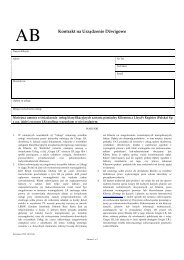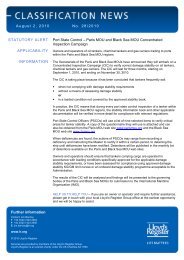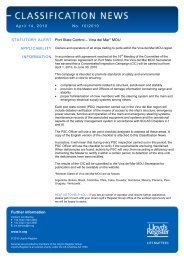A special Lloyd's Register Horizons supplement
A special Lloyd's Register Horizons supplement
A special Lloyd's Register Horizons supplement
Create successful ePaper yourself
Turn your PDF publications into a flip-book with our unique Google optimized e-Paper software.
<strong>Horizons</strong> <strong>supplement</strong> February 2012<br />
Future fuels and fuel management<br />
Piet Mast, Lloyd’s <strong>Register</strong>’s<br />
Marine Business Manager for<br />
Western Europe<br />
Methanol a potential<br />
fuel requiring more<br />
attention<br />
One of the fuels Lloyd’s <strong>Register</strong> is looking<br />
at is methanol. Methanol is sulphur free,<br />
has a reduced impact on emissions,<br />
is currently 3 to 4 times cheaper than<br />
marine distillate fuel and has a beneficial<br />
likely EEDI result. It is non cryogenic and<br />
is readily produced for a wide range of<br />
chemical uses including for combustion.<br />
Production is currently nearly 50 million<br />
tonnes per annum. It has a great potential<br />
for high production and ease of using<br />
existing distribution infrastructures.<br />
Easily produced and safe to transport, it<br />
has the benefit of being able to be made<br />
from the widely available natural gas or<br />
from biogas which in turn could be made<br />
from second generation renewables.<br />
The world’s first<br />
new LNG-fuelled<br />
tanker is classed<br />
by Lloyd’s <strong>Register</strong><br />
The arrival of Argonon (see photo on page 2),<br />
a 6,100 dwt dual-fuelled chemical tanker,<br />
is a significant milestone for the Deen<br />
Shipping subsidiary, Argonon Shipping, in<br />
its pursuit of cleaner transport solutions for<br />
Europe. Lloyd’s <strong>Register</strong> helped the owners<br />
and regulators identify their risks, meet<br />
regulatory requirements and overcome the<br />
technical challenges for the precedentsetting<br />
tanker.<br />
“This has been a great project and is a<br />
significant first,” said Piet Mast, Lloyd’s<br />
<strong>Register</strong>’s Marine Business Manager for<br />
Western Europe. “The nature of inland<br />
waterways traffic, which passes through<br />
or close to major population centres,<br />
makes LNG an attractive way to reduce<br />
harmful local emissions. We had to look<br />
carefully at the risks and worked closely<br />
with the owner and the regulators to<br />
ensure that they understood, and were<br />
comfortable with, the technical solutions<br />
that were developed.”<br />
The dual-fuel system is designed to burn<br />
an 80/20 mixture of natural gas and<br />
diesel, reducing SO x , NO x and particulatematter<br />
emissions, as well as reducing the<br />
greenhouse gas emissions from tank to<br />
flue. The LNG is stored in a transport tank<br />
located on deck, supplied by Cryonorm<br />
Projects, based near Amsterdam.<br />
“The inland shipping industry, as far as we<br />
know, is the safest and cleanest mode of<br />
transport. But, to keep this lead, we have<br />
to take a big step forward in environmental<br />
performance,” said shipowner Gerard<br />
Deen. “I think that the dual-fuel principle<br />
is a way to reduce the emissions in our<br />
sector. Lloyd’s <strong>Register</strong> was very pragmatic<br />
in their approach to finding solutions to<br />
convert seagoing regulations into inland<br />
shipping rules regarding dual fuel.”<br />
Built by Rotterdam’s Shipyard Trico BV,<br />
Argonon is 110 metres long and propelled<br />
by two, dual-fuel Caterpillar DF3512<br />
engines, each providing 1,115 kW. The<br />
ship has the capacity to transit from<br />
Rotterdam to Basel and back<br />
without bunkering.<br />
“We are currently providing technical<br />
and regulatory guidance for 20 confirmed<br />
or proposed inland waterway applications<br />
that intend to use LNG as fuel,” said<br />
Bas Joormann, Lloyd’s <strong>Register</strong>’s West<br />
European Area Inland Waterway<br />
Product Manager. “There is a lot of<br />
interest, and for good reason. Inland<br />
waterways, like ferries in emission-control<br />
areas, are very suitable for LNG. But the<br />
regulatory regime is different. We’re<br />
helping owners and governmental bodies<br />
to identify the risks and manage them<br />
to at least the level of safety provided<br />
by the existing fuel-management and<br />
combustion requirements.”<br />
Leading the<br />
way in LNG<br />
as fuel<br />
understanding<br />
Lloyd’s <strong>Register</strong> runs a busy programme<br />
of seminars worldwide, many of which<br />
pull in leading industry stakeholders<br />
to provide a broad perspective<br />
to attendees. Environmental and<br />
operational efficiency seminars were<br />
very popular in 2011. In particular, LNG<br />
as fuel seminars in London, Busan,<br />
Vancouver and Tokyo attracted large<br />
audiences looking at the broad range<br />
of LNG issues.<br />
LNG bunker<br />
tank location<br />
The location of storage tanks is a key issue<br />
for consideration, particularly on cruise<br />
ships, containerships and ferries where<br />
there is little or no alternative to LNG<br />
bunker space within or below a vessel’s<br />
accommodation area.<br />
It’s an issue Lloyd’s <strong>Register</strong> is currently<br />
studying and our Global Marine Risk<br />
Adviser Vince Jenkins takes a refreshingly<br />
optimistic view of how to handle it. He<br />
says Lloyd’s <strong>Register</strong> “undoubtedly can”<br />
find a way to approve LNG tanks. “The<br />
cost of achieving it may be significant, but<br />
the technology and design capability is<br />
certainly about to achieve it,” he says.<br />
“Class societies are a keystone of safety<br />
in the marine industry. They also need to<br />
be visionary from time to time. In Lloyd’s<br />
<strong>Register</strong>’s case we are a charity and<br />
everyone in society is our stakeholder.<br />
Hence we need to provide a framework<br />
that will allow innovation – while ensuring<br />
the balance between environmental gain<br />
and safety is duly considered,” says Vince.<br />
Vince Jenkins, Lloyd’s <strong>Register</strong>’s<br />
Global Marine Risk Adviser<br />
“We cannot yet judge what the outcome<br />
of such development work will be, but we<br />
are certainly looking at it to enable such<br />
technology to be embraced within the<br />
industry,” adds Vince.<br />
A full version of Vince Jenkin’s article<br />
on LNG storage is in the January issue<br />
of <strong>Horizons</strong>.<br />
LNG as fuel bunkers<br />
Lloyd’s <strong>Register</strong> has been<br />
studying the issues<br />
One of the largest obstacles to widespread<br />
take-up of LNG as fuel is the lack of a<br />
bunkering network. At present deep sea<br />
ships have no access to LNG as a marine<br />
fuel – even if they wanted it. Lloyd’s <strong>Register</strong><br />
has been researching the issues around a<br />
bunker network and infrastructure for the<br />
shipping industry.<br />
Lloyd’s <strong>Register</strong> has been examining trade<br />
patterns and existing bunker trends by<br />
ship type and size; examining the fuel<br />
consumption requirements; assessing the<br />
potential availability of LNG worldwide; and<br />
surveying the key stakeholder groups to<br />
understand their needs.<br />
Findings are expected to be available in March.<br />
5<br />
million tonnes<br />
(Methanol produced per annum)<br />
“In the past, Lloyd’s <strong>Register</strong> and other<br />
class societies have achieved this by<br />
developing prescriptive rules. There is<br />
a move to a more goal-based approach<br />
to drive rule development. And this is<br />
exactly what we are doing on the<br />
subject of LNG tank placement within<br />
or under accommodation.<br />
<strong>Horizons</strong> is Lloyd’s <strong>Register</strong>’s Marine industry magazine –<br />
published three times a year and <strong>supplement</strong>ed from time<br />
to time, with focused editions such as this Technology and<br />
Innovation <strong>special</strong>. To download a pdf of <strong>Horizons</strong> go to:<br />
www.lr.org/horizons<br />
04<br />
05






